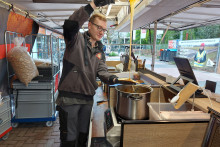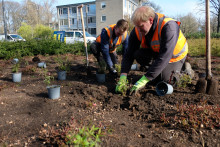During these last Easter holidays, a few friends from my hometown had the chance to visit the Netherlands. I, who have been studying in the country for almost two years now, was naturally appointed as their tour guide, their key to all the wonders and curiosities of Dutch culture.
While I was fulfilling my role, I taught them basic responses like ‘dank je wel’ and helped them translate some road signs. However, I found myself apologizing more than once for not being able to translate long phrases or texts. I had to explain, to my friends’ astonishment, that international students are completely able to survive in the Netherlands speaking solely in English.
Each person coming from abroad has a different opinion on whether learning and mastering Dutch is desirable or necessary at all. I know folks who have gone through several levels of Dutch courses. Some people use apps to practice the basics, and some others have given up since day one. My personal take is that it sucks not speaking Dutch while living here, but it also sucks having to devote so much time and effort to learn something that everyone around you says you don’t need! ‘I wouldn’t learn it if I was you,’ a lot of Dutch friends have told me, ‘you’re never going to use it.’
Regardless of your level of commitment, or disregard to that language, there are still some words and phrases that stick with time. The food labels at the supermarket, for instance, start to become quite readable. The indications of train drivers or the cashier asking whether you want your receipt are messages which can be easily interpreted after a few months. Still, it would be a lie to say there aren’t moments when I regret not practicing it more.
Those awkward situations where you’re the only exception in an all-Dutch table, I don’t really mind. But sometimes a nice old lady approaches me at the park and tells me something with a smile. I have no choice but to nod and smile back even though I have no idea what she just said. Or that one time a young child was helplessly lost in the streets, it was really frustrating not being able to ask her where her parents were.
Such situations make me consider that even though Dutch might not be necessary to survive here, not mastering it can still be a bit isolating, as if that language barrier stops you from blending entirely with your surrounding. Nevertheless, it is noteworthy and exceptional that 99.9% of the time one can make his or her way around this country by speaking in English. And, for what is worth, that is in itself a wonder of Dutch culture I was able to share with my visiting friends.







